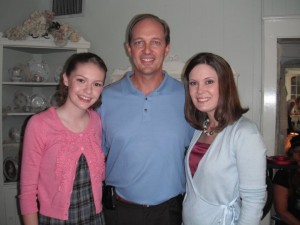Observations Of A Youngling: Biased Expectations
Intro
I cut my teeth onĀ Frank Peretti and Francine River’s The Atonement Child at age 12. Anne of Green Gables, Mandie Mysteries,Ā and the Great Illustrated Classics novels were…just how I grew up.Ā What we call YA or middle grade, I probably was too old for by seventh grade. (I knew no distinction: A ‘kid’s book’ was a picture book or anything under 250 pages.) That 6th-9th grade period was a time when I was reading every book about the end times or spiritual warfare that I could find–most of it complete with exorcisms, conversions, and verse-quoting. This didn’t bother me. I’d developed a strange fascination with The Other World. You know, the world outside our natural sensory perception but no less real, no less tangible if made manifest to us.Ā I was convinced alien encounters were demon encounters and it didn’t bother me if characters preached or quoted Scripture forĀ pages and pages.Ā I could plough my way through “slow” plots and the idea of someone walking up to me and offering to lay hands on my head were, well, not that odd.
Those days of innocent youth long past. I didn’t know anything about CBA–I didn’t know CBA and ABA existed. Nor, IĀ think, would I have cared all that much. Well, I might have to the point of being annoyed at all the adults arguing over how spiritual something was, or whether a swear word should be there, or whether it was “Christian enough” (whatever that means).
I got my first rejection letter at 11 or 12, I think: a fifteen-page short story neatly placed in a mailing envelope and mailed to the publisher’s house listed on the back of one of my beloved books with $3.50 in pocket change (coins and ones) for shipping and handling.
I started reading Star Wars sometime in high school. I read The Golden Compass as either a fifth or sixth grader and, honestly, found the whole daemon thing interesting but was otherwise a bit lost on the plot of the whole thing.Ā (This was before the movie brought up all the controversy, so you know. Over a decade ago.) My first Ted Dekker novel was Heaven’s Wager, shortly after my high school graduation.Ā Ā My final semester of college I picked up Dean Koontz’sĀ Frankenstein books because, well, the concept intrigued me.
The world opened to me in college. I discovered I like Solzhenitsyn, Achebe, and Wilde; and that I don’t care so much for British poets who were high on opium when they wrote their ‘masterpieces.’ Something else happened, though. I discovered I like swashbuckling pirate stories, dragons (especially good dragons!) and knights, warriors and shield maidens (I did not know Lord of the Rings or Tolkien existed until the first movie started getting everyone hyped up, and then I had to go read them before seeing the movies). Faeries, shapeshifters, trolls, half-dragon people, o’rants, emerlindians, doneels, gladiators, kings, and epic tales, retellings of Greek myths and Celtic lore.
Yeah…I turned into a speculative fiction fan long before I discovered the word existed.Ā I was writing it all along, because it was easy for me, but I absolutely refused to call it that, to the point that my friends would tease me because there was no way around calling a story about a world that doesn’t exist “fantasy.”
I was such a snob. An innocent one, but a snob.
Expectation
I’m telling you all of this by way of introduction, so the rest of this makes sense.Ā I’ll be posting every other Wednesday, and I’ve been asked to discuss the whole CBA thing, some of the recurring debates and themes, andĀ how our biases can color our perspective. But for that to all make sense, keep a few things in mind:
- I once didn’t like fantasy
- I grew up in a Christian home in church at a Christian school, and to this day most of the authors I read are Christians unless they’re recommended to me
- My entire paradigm on the arts–at least on books–shifted (or, more precisely, formed, in college)
- I used to find “the line” by standing on it (and admitted it)
- I’m pretty sure I had mastered third person omniscient as a teenager, before I had it beaten out of me
- I was a “seat of the pants” writer to the Nth degree until someone made me learn how to storyboard
- I am a church brat
Okay, now that that’s all out of the way.Ā These days, I wouldn’t headhop if my life depended on it, and God forbid anyone use cutesy fake swear words, pray, go into lengthy exposition, or–worst of all–talk to their opponent while fighting (insert weeping and gnashing of teeth here). You know, God forbid a Christian character actually quote Scripture whileĀ consoling a friend. God forbid a character sink into “why did God let this happen?” and “why are all these bad things happening to me?” (okay, I’m still going to throw things and grind my teeth if that happens).Ā You get the idea.
I think it was my first year out of college that I really noticed my change inĀ bias. I remember reading a Tozer book borrowed from Mom and was frustrated that I had such a struggle over the older language. (Remember, I grew up on King James;Ā reading dense literature with a vast vocabulary may have been challenging, but my parents are readers, I’m a reader, and my parents weren’t really in the habit of talking down to my sister and I, so, even as a child, I was unphased by having to stop and figure out a word, either by context, my parents, or the dictionary.)
Yes, a college education later, and I was getting frustrated over 20th Century English.
I remember reading for a book review in college and being frustrated by the slower pace. There wasn’t much happening. I could not slow down and digest the book.Ā Maybe my brain was just fried from everything I had to read as an English Lit major for class, but I really had to work my way through it.
Mostly I read suspense, mystery, and now the fantasy (mostly YA with a little adult).Ā Mostly, I want to be on the edge of my seat, breathless and fussing at characters and staying up far too late into the next morning for my trouble. I love suspense. For me, the time between purchasing Christmas presents and Christmas Eve (yeah, mine starts early) is just as wonderful as actually opening the present.
I used to be able to sit perfectly still for hours at a time.Ā I didn’t have a phone or use the internet till college, and I didn’t really need it or care.Ā I still can’t read off a screen very well. I used to write by hand. Now, I’m quite happy my brand-new, three-weeks-old-by-the-time-this-posts iPhone will email my notes so I can copy onto my laptop.Ā Now I can’t stay in the house more than two or three days at a time before I will do anything to get out. I can barely watch more than an hour of TV at a time.
Funny, that is.
My point: Some books are steak and potatoes for the brain. Others are pretty much popcorn and M&Ms–good, but not sustaining.Ā And either you want the steak and potatoes, or you want the popcorn and chocolate. Or pizza.
You know, as readers we develop biases (and it gets worse when you start getting serious as a writer–far worse). We know what we like and how we like it; and that’s the way it’s going to be. Some won’t touch a book if it has a single swear word; others won’t touch the book if it doesn’t. Some people likeĀ the conversion arcs and exorcisms and theologyĀ lessons. Others don’t. Some people don’t mind violence, but if characters so much as hold hands they’re going to flip. Or vice versa.
I’ll be perfectly honest: Sometimes, I want my steak. Other times, pass the Reese’s.
I got to thinking about all this while reading a historical romance novel –not normally something I’d touch. I’ll read anything else: Westerns, historical, speculative,Ā adventure, “literary,” mystery, suspense . . . But, please, for the love of all things holy, profane, and in between…no romance.
Sometimes, though, stories surprise you. If you never read beyond your own bias, then you miss out on an entire spectrum of books.Ā You’ll findĀ yourself appreciative, if nothing else. Getting outside a suspense novel lets you experience other emotions besides fear and weightiness. Getting outside fantasy, at least for me, forces you to back away from the crutch of superpowers and the distance of non-existent lands. Sometimes, a book with a lipstick tube on the cover turns out to be a fun, witty, calculated look atĀ women’s roles and female pastors (without the stereotypes and caricatures, to boot).
One thing I keep hearing other writers insist is that they’ve got to fight the rut, the formula. A bias, such as never reading X type of book, or refusing to do or write Y, or allow Z, is to, in some ways, cripple the writer’s abilities. You’ll eventually bore yourself, or, worse, your reader, and eventually you’ll fall into a formula because it’s comfortable.
Too often in these CBA/ABA debates (which sound so, so, so much like church fights it gives me a tick and bad flashbacks) I see the same basic biases: EitherĀ in favor of a generic,Ā “everything goes” with absolutely no patience for the verse-quoting country boy preacher (yeah, you know what I mean) or the little Christian housewife who daily instructs her children to “Do the Lord’s will” and praise only for tattooed, beer-downing, blue-streaking, prickly old rednecks ; or in favor of crew-cut choir boys who wouldn’t know temptation if it bit them in the nose and absolutely no quarter for so much as the word “darn.” (How “Lordy” makes the cut, I’m never quite sure.)
My, my, this is so familiar to me.
Biases. They’re wicked, no matter which way you slice them. Jesus said so.
So, sometimes, I watch a chick-flick. Or read its novel equivalent.
Sometimes, I read a book a decade under my reading level. For fun.
Sometimes, I take a chance on the “secular” book.
Other times, I dare return to the “preachy white-washed tomb”Ā fiction.
But I’ll tell you what the bias does: It colors my expectations. It’s really hard to appreciate a gentle-paced, narrative-rich, inner-monologue driven book whereĀ the bulk of the plot deals with internal demons instead of external, and where a priest may well just launch into a three page Passover speech, much to the chagrin of an impatient reader.Ā Or the most harrowing event in the book is a close call with a school bully.
Really.
False Expectation
I’ll get to my over-all thoughts on the whole CBA squabble, but first I think it good to explore the biases we’re bringing to the table. I remember I once grew infuriated with a woman who completely freaked out because she writes inspirational stories, and here she is reading my dystopian sci-fi world where one character is insane and the other is freaking out because she’s worried he’ll get suicidal again and can’t find her keys–there it is. The female character says, “Keys, where are my Godforsaken keys?”
It’s the middle of the night. She thinks her friend is suicidal. He’s tried before. He hung up before, too. She’s terrified.
And this inspirational-story writer completely freaked out because I said the crazy male character swore (he thought he was covered in blood, but it was wine) and the worried woman said “godforsaken keys.”
In all caps, the woman wrote to me, “GUESS THIS ISN’T AN INSPY!!!!”
I’m glad she noticed. That all happened in one chapter. About five pages.Ā But there you have it: Her bias led her to assume a genre, and to assume how characters within a genre would react.
It’s just like me and chick-flicks: Eye-rolls every time the “hot other” is mentioned.
The End of the Beginning
So there you go: I’m a spec-fic writer. And I read all the frustrations. I understand them. But look at history: People were racially, socially, or economically biased based on their own perceptions of the world. In some respects, all sides could use a perspective change.
I think it’s a little biased to assume all CBA has some conspiracy going. Honestly, in the end, I think CBA publishers are businessmen first.Ā And yeah, I think some things definitely need to go by the wayside because those things should never have crept in to begin with.
But I also think the disgruntled fantasy writer who can’t get published because of the evil CBA people who can’t get a clue are, well, equally biased and equally a bit crazy. Hear me out here: I get the frustration.Ā I’ve beenĀ there. But, honestly, other than one or two small things, I really haven’t had any trouble. And coming out with both arms swinging is going to get you nothing but the brawl you came in for. Remember those Westerns?Ā Yeah. Cowboys get in fights because they go looking for them.Ā If they wanted to settle it without gun-slinging, they would.
Plus, it’s unbecoming. Remember those church people who do nothing but complain but don’t lift a finger to help change “the system”?
Those people.
Okay, so I know that’s not everyone. Bias runs both ways, though. Bias mocks “Amish fiction” (whatever that strange term is that I’ve only in the last year learned) instead of focusing on priming your own genre.Ā Bias criticizes the faults of romance novels without scrutinizing the limitations of a suspense novel or the potential crutch fantasy can become (more on that another day).Ā Bias insists superiority because “Well, I don’t do that!”
No, you don’t.
But maybe you rely too much on the supernatural (my bane). Or too much on that magnificent twist at the end. Or the ease of a Three-Act whodunit.Ā The terror and darkness that overwhelms horror.
Or maybe your characters just talk too much.
Here’s the thing: It’s bad form to come into a spec-fic book and expect, well, ordinary things. It’s probably bad form to expect a romance novel to focus so much on the war going on in the backdrop. And it’s probably too much to expect “Amish” to have tattooed, beer-guzzling, sailor-talking swashbucklers (maybe pitchfork-wielders). Just sayin’. There’s a reason they tell you to know your own genre. But know the others, too.
The thing is, we make fun of rich people who “don’t get” people who actually have to work for a living, and we make fun of backwoods rednecks who still think the Civil Rights Movement didn’t happen, but the truth is, the same deserved mockery applies in fiction.
A historical, literary, “Amish,” or romance type novel is simply not going to be fast-paced and action oriented. It’s just not. By raising false expectations, you just set yourself up to hate the book. And it may be excellently written, but you’ll still hate it. “Mind-blowing” and “thriller” just don’t describe these books. It’s silly to expect them to.
And it’s silly to assume that everyone likes the same books. We don’t.Ā Spec-fic is, for the most part, considered occultic or geekdom (at least in my experience): unsophisticated and probably a bit adolescent, like Star Trek junkies. If that’s going to change,Ā we have to be more than geeks.
I guess this horse is dead, but I think, on some level, people are attracted when they see you’re not bound by your own bias.Ā My friend who doesn’t like fantasy will read mine because, according to him, I don’t do all the things fantasy writers are notorious for. My mother reads Karen Hancock, Sharon Hinck, andĀ D. Barkley Briggs’ The Book of Names because I swore up and down she’d love them (she’s suddenly on a Koontz phase, ironically enough).Ā And I was right. (I still read all my fantasy books first, just to make sure she’ll like it.)
You know these stories: Rich guy wants to change his bias against the working class, he’s got to get among the working class. A king wants to know his people, he disguises himself as a servant. A Christian wants to stay in touch with the world, he must be in the world.Ā A writer wants to keep some sense of reality, he must occasionally put down his pen or keyboard.
Yeah, a mile in their shoes, right?
I know, it feels all one-sided. But, like my dad drilled into my head, “If nothing changes, nothing changes.”Ā The only way a prejudice changes is to break through it.


































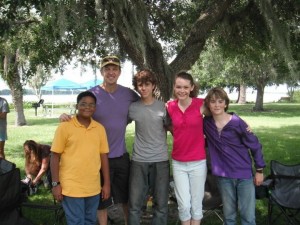


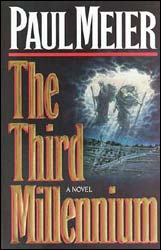
 And no, this is not from the Left Behind series. Despite their flaws, they were certainly not like this. Instead Iām quoting from an earlier, more forgettable book called The Third Millennium.
And no, this is not from the Left Behind series. Despite their flaws, they were certainly not like this. Instead Iām quoting from an earlier, more forgettable book called The Third Millennium.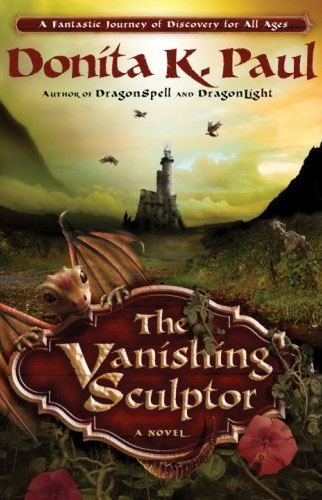
 Number 3,
Number 3,  Description.
Description. Description.
Description.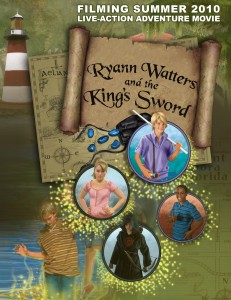
![2010-0525 One Sheet Front[1]](http://www.speculativefaith.lorehaven.com/wp-content/uploads/2010/09/2010-0525-One-Sheet-Front1-231x300.jpg)
